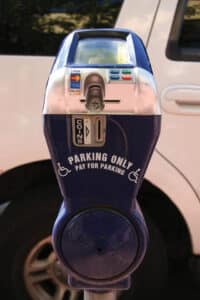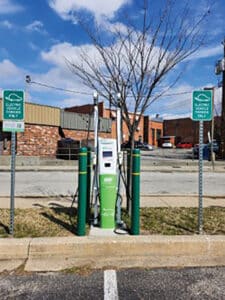
Transportation Equity
Transportation Equity aims to ensure that all community members’ needs
Share:
Share:
The Parking Authority of Baltimore City (PABC) recognizes that the “parking” aspects of transportation need to work for everyone. Here in Baltimore, where income disparities vary wildly, less than 20% of the housing stock are detached single-family homes, and 30% of residents do not own a car, it is vital that we keep all people and their varied circumstances in mind when we make decisions. From the types of payments we accept, to the placement of car sharing vehicles and electric vehicle (EV) charging stations in Baltimore City, we are intentionally building equity into all that we do.

Baltimore City officials rely on us to be the parking experts in the city. We oversee the management of 13 city-owned or leased parking garages and 20 parking lots. We manage the placement, hours of operation, and rates of on-street parking meters. We administer the City’s Residential Permit Parking (RPP) and Residential Reserved Disabled Parking (RRDP) programs. We do not oversee parking enforcement, but we do work closely with the Department of Transportation, which does have that responsibility so that we can coordinate the administration and enforcement of parking programs and projects.
We provide equity in our on-street metered parking program in three ways.
As the Abell Foundation reported in 2019, 21% of Baltimoreans are unbanked. Because of this, each parking meter in Baltimore City accepts credit cards and coins. As many in the parking industry move to restrict payment to credit cards only (through parking meters or apps), we will not make the switch. To make our services available to everyone in the community, we recognize that we need to continue to accept cash payments at parking meters and at off-street parking facilities, at least until viable non-cash payment options are available to people who are unbanked. Although more transactions are made by credit or debit cards, we intentionally keep cash as a payment option to serve all Baltimoreans.
The second way we ensure equity in our on-street metered parking program is by providing a range of parking meter rates, including more affordable lower-cost options, in the major metered parking areas of the city through demand-based parking meter rates. Our goal is to have, on average, one or two available parking spaces per block face in metered areas of the city. To meet that goal, every six months we analyze the number of cars parked on each metered block and compare it to the approximate number of cars that could park at maximum capacity to know the occupancy rate of each block within the target area. We aim to make one or two parking spaces available on every block in metered areas, or between 75% and 85% occupancy. When the occupancy rate is below 75% on a particular block, we want to draw more parkers to that block, so we will lower the rate to attract more parkers. If the rate is higher than 85% in a particular block, there is not enough available parking in that block, so we increase the hourly rate by $.25 to encourage some parkers to look for a better deal elsewhere. If occupancy is in our target range – between 75% and 85% – the rate will not change. We increase or decrease rates slowly and incrementally. We only increase or decrease rates by $.25 and only every six months. By following this formula, we not only have more parking availability but also have a variety of price options in every major metered parking area of Baltimore.

In addition to Project Space, we have several other programs and initiatives that provide parking equity for people with disabilities.
Working closely with the Mayor’s Commission on Disabilities, we invested significantly in upgrades to Baltimore City-owned and/or PABC-operated garages and parking lots to meet or exceed Americans with Disabilities Act (ADA) guidelines. These improvements, such as making sure the correct number of spaces are reserved for people with disabilities, that those spaces are close to elevators, and that ramps, doorways, and elevators meet ADA standards, set the mark for private parking facility operators throughout Baltimore City. Many other garages in Baltimore made similar improvements so now people with disabilities can park in off-street facilities close to wherever they want to go in popular areas in the city.
Rowhomes are a large portion of Baltimore’s housing stock. Most of those rowhomes have no associated off-street parking. PABC’s Residential Reserved Disabled Parking program allows residents with permanent mobility-restricting disabilities, and who have no off-street parking options at their residence, to have a reserved parking space installed on-street in front of their homes, thereby enabling them to access work, shopping, entertainment, and health appointments.
We have made our website accessible so people with visual impairments can get the information they need with a website reader. We removed busy infographics that could not be interpreted by e-readers and made hyperlinks more informative. As the City undergoes a new website upgrade, we will make further improvements to ensure that visually impaired readers (and everyone else) can easily find and get the information they need on our website.

We know many Baltimore residents cannot afford to own a car and depend on alternative forms of transportation to get around. That is why we supported the emergence of a free shuttle service, support bicycle infrastructure, and car sharing. If we only supported the parking of personally owned, four-wheeled vehicles, we would be neglecting a large portion of Baltimore residents for whom car ownership is out of reach.
To promote transit ridership, in 2010 Baltimore City launched a free bus service through several neighborhoods. Funded largely by parking revenues, the Charm City Circulator added a GPS tracking system in 2019 so riders can track where to catch one of the free shuttle buses on a smartphone app. The service reduces congestion and greenhouse gas emissions with eco-friendly buses running along 4 routes through the heart of Baltimore City. PABC was instrumental in identifying a sustainable revenue stream to make this possible.
The Parking Authority supports bicycle infrastructure, such as adjusting on-street parking to accommodate bike lanes wherever possible and adding bicycle parking on-street and off-street. When we converted hundreds of single-space parking meters to multi-space parking meters in 2004, we worked with the Department of Transportation to leave some posts in place and converted them to bicycle parking. In 2007, we converted on-street parking spaces for cars into parking spaces for bicycles.
In 2009, we converted unused space within our Lexington Street Garage to a secure bicycle parking room. Holding 50 bicycles and a bicycle maintenance stand, bicyclists now had a safe space to leave and service their bikes during the workday, encouraging bicycle commuting.
Supporting car sharing brings the convenience of driving to residents who cannot take on the financial burden of car payments, insurance, gas, and regular car maintenance. When we brought car sharing to Baltimore in 2010, we required Zipcar to place vehicles in neighborhoods where residents cannot afford to own their own vehicle. Many neighborhoods in Baltimore’s low-income neighborhoods often feel overlooked when it comes to city-supported amenities. We wanted everyone to benefit from what car sharing provides – easy and affordable access to a car without the financial burdens of vehicle ownership. To meet these equity requirements, Zipcar placed vehicles in food deserts and in low-income neighborhoods with low rates of vehicle ownership. Residents in these areas can now drive to doctor’s appointments, job interviews, grocery stores, or wherever they want to go, especially if it’s somewhere that transit does not go, or it would be inconvenient to carry bulky items.
Since 2012, the Parking Authority has provided up to two hours per week to each team member to volunteer with Reading Partners Baltimore, a non-profit organization that trains and pairs adults with kindergarten through fourth grade students who are struggling to learn to read in participating Baltimore City Public Schools. Once a year, PABC hosts information sessions with Reading Partners to recruit more volunteers. We also host book drives at every Baltimore City-owned garage, collecting and distributing hundreds of age-appropriate books to Reading Partners Centers where they are given to students after each tutoring session.
More than 15 Parking Authority volunteers, many of whom have volunteered for multiple years, have delivered over 650 tutoring sessions in nine partner elementary schools.
By focusing on equity in all that we do, PABC works to ensure that our programs and the parking assets that we manage benefit everyone. ◆
Peter Little is the Executive Director of the Parking Authority of Baltimore City.

Transportation Equity aims to ensure that all community members’ needs


Transportation equity requires understanding the needs of every person potentially
Parking & Mobility is IPMI’s flagship publication, covering the news, trends, analysis, technologies, and people of the parking and mobility industry, and how it affects and influences communities around the world.
| Cookie | Duration | Description |
|---|---|---|
| cookielawinfo-checkbox-advertisement | 1 year | Set by the GDPR Cookie Consent plugin, this cookie is used to record the user consent for the cookies in the "Advertisement" category . |
| cookielawinfo-checkbox-analytics | 11 months | This cookie is set by GDPR Cookie Consent plugin. The cookie is used to store the user consent for the cookies in the category "Analytics". |
| cookielawinfo-checkbox-functional | 11 months | The cookie is set by GDPR cookie consent to record the user consent for the cookies in the category "Functional". |
| cookielawinfo-checkbox-necessary | 11 months | This cookie is set by GDPR Cookie Consent plugin. The cookies is used to store the user consent for the cookies in the category "Necessary". |
| cookielawinfo-checkbox-others | 11 months | This cookie is set by GDPR Cookie Consent plugin. The cookie is used to store the user consent for the cookies in the category "Other. |
| cookielawinfo-checkbox-performance | 11 months | This cookie is set by GDPR Cookie Consent plugin. The cookie is used to store the user consent for the cookies in the category "Performance". |
| CookieLawInfoConsent | 1 year | Records the default button state of the corresponding category & the status of CCPA. It works only in coordination with the primary cookie. |
| elementor | never | This cookie is used by the website's WordPress theme. It allows the website owner to implement or change the website's content in real-time. |
| viewed_cookie_policy | 11 months | The cookie is set by the GDPR Cookie Consent plugin and is used to store whether or not user has consented to the use of cookies. It does not store any personal data. |
| Cookie | Duration | Description |
|---|---|---|
| _ga | 2 years | The _ga cookie, installed by Google Analytics, calculates visitor, session and campaign data and also keeps track of site usage for the site's analytics report. The cookie stores information anonymously and assigns a randomly generated number to recognize unique visitors. |
| _ga_02PMHW8YWC | 2 years | This cookie is installed by Google Analytics. |
| _ga_LC0QJJHM3J | 2 years | This cookie is installed by Google Analytics. |
| _ga_V9KYTSBYT2 | 2 years | This cookie is installed by Google Analytics. |
| iutk | 5 months 27 days | This cookie is used by Issuu analytic system to gather information regarding visitor activity on Issuu products. |
| Cookie | Duration | Description |
|---|---|---|
| mc | 1 year 1 month | Quantserve sets the mc cookie to anonymously track user behaviour on the website. |
| Cookie | Duration | Description |
|---|---|---|
| ultp_view_1052 | 1 day | No description |
| ultp_view_1058 | 1 day | No description |
| ultp_view_1060 | 1 day | No description |
| ultp_view_1064 | 1 day | No description |
| ultp_view_1068 | 1 day | No description |
| ultp_view_1070 | 1 day | No description |
| ultp_view_1072 | 1 day | No description |
| ultp_view_1078 | 1 day | No description |
| ultp_view_1082 | 1 day | No description |
| ultp_view_1088 | 1 day | No description |
| ultp_view_1100 | 1 day | No description |
| ultp_view_1103 | 1 day | No description |
| ultp_view_1114 | 1 day | No description |
| ultp_view_1118 | 1 day | No description |
| ultp_view_1122 | 1 day | No description |
| ultp_view_1125 | 1 day | No description |
| ultp_view_1130 | 1 day | No description |
| ultp_view_1132 | 1 day | No description |
| ultp_view_1135 | 1 day | No description |
| ultp_view_1541 | 1 day | No description |
| ultp_view_1554 | 1 day | No description |
| ultp_view_1557 | 1 day | No description |
| ultp_view_1560 | 1 day | No description |
| ultp_view_1563 | 1 day | No description |
| ultp_view_1568 | 1 day | No description |
| ultp_view_1572 | 1 day | No description |
| ultp_view_1576 | 1 day | No description |
| ultp_view_1580 | 1 day | No description |
| ultp_view_2305 | 1 day | No description |
| ultp_view_2321 | 1 day | No description |
| ultp_view_2338 | 1 day | No description |
| ultp_view_2342 | 1 day | No description |
| ultp_view_259 | 1 day | No description |
| ultp_view_270 | 1 day | No description |
| ultp_view_275 | 1 day | No description |
| ultp_view_286 | 1 day | No description |
| ultp_view_3074 | 1 day | No description |
| ultp_view_3115 | 1 day | No description |
| ultp_view_3334 | 1 day | No description |
| ultp_view_3336 | 1 day | No description |
| ultp_view_3338 | 1 day | No description |
| ultp_view_3340 | 1 day | No description |
| ultp_view_3346 | 1 day | No description |
| ultp_view_3354 | 1 day | No description |
| ultp_view_3361 | 1 day | No description |
| ultp_view_3367 | 1 day | No description |
| ultp_view_365 | 1 day | No description |
| ultp_view_367 | 1 day | No description |
| ultp_view_38 | 1 day | No description |
| ultp_view_3846 | 1 day | No description |